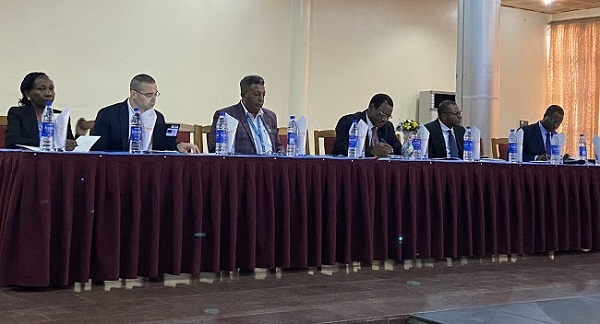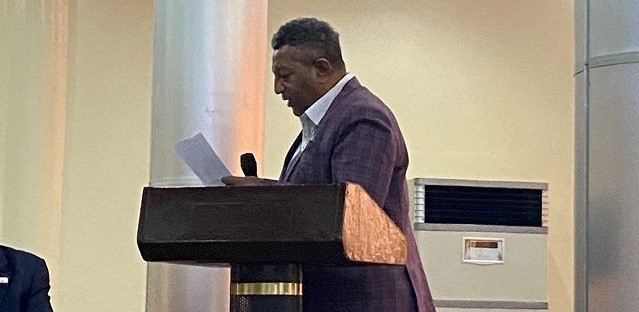Ahead of plans to submit a revised Nationally Determined Contribution (NDC) at the 26th session of the Conference of the Parties (COP26) to the United Nations Framework Convention on Climate Change (UNFCCC) holding in Glasgow, UK in November 2020, Nigeria has effectively commenced a revision of the document.

A requirement under the Paris Agreement, NDCs embody efforts by each country to reduce national emissions and adapt to the impacts of climate change. Under the NDC, Nigeria intends to end gas flaring by 2030, with 45 per cent conditional and 20 per cent unconditional emission reduction.
The United Nations Environment Programme (UNDP) has been supporting the implementation of Nigeria’s NDC through its flagship NDC Support Programme (NDC SP). As a member of the NDC Partnership, UNDP is providing additional technical and financial assistance to the nation’s NDC revision through the Climate Promise – a commitment by the UN body to support 100 countries in the revision of their NDC by end of 2020.
UNDP’s intervention in Nigeria’s NDC revision process is focusing on the water sector, short-lived climate pollutants, forestry and other nature-based, gender integration as well as whole-of-society participation and the social and employment impacts of NDC measures.
At a daylong forum in Abuja on Thursday, March 5, 2020 to officially launch the NDC revision, the NDC Partnership Support Unit and a team from UNDP interacted with sectors and partners.
The UNDP said at the opening of the NDC Revision Inception Workshop that it is committed to support at least 100 countries to ensure that their Nationally Determined Contributions (NDCs) are more technically robust.
Lealem Dinku, Deputy Resident Representative – Programme, UNDP, said that the UNDP would partner with the Federal Ministry of Environment and other partners to actualise the Climate Promise on climate change in the country.
“The UNDP Climate Promise is our commitment to support at least 100 countries to enhance their NDCs by 2020.
“Our commitment is to work with countries to make their NDCs more technically robust and include new ways governments can step up their climate actions and finance these bold new goals.
“We will work with the environment ministry to build on our ongoing work on climate change which includes review of the climate change policy and establishment of regional youth climate change hub.

“The commitment of the UNDP is to do more to support Nigeria’s aspiration to lead the charge in Africa on combating climate change to the benefit of the people.
“This is why last week, we worked with the stakeholders to develop a joint framework for the harmonisation of the NDC targets, SDGs, Sendaii framework into the economic growth and recovery plan.’’
Dinku said that the UNDP support team and the NDC partnership would provide technical assistance to the country to revise its NDCs through an inclusive and transparent.
He said that the effort offered opportunity to engage with the government, academia, civil society organisations and the private sectors and development partners.
He said that the vital element for a successful enhancement of the NDC was a strong political determination and societal ownership at national and sub-national levels.
“Today’s NDC revision is a demonstration of UNDP’s strong commitments.
“The commitment is to keep the climate promise to Nigeria in recognition of the President Mohammadu Buhari’s exemplary commitment to tackling the climate emergency working with all stakeholders
“The UNDP is therefore very proud to be hosting this mission with the NDC partnership and are convinced that the national roadmap from this meeting will greatly enhance Nigeria’s meeting its obligations under the Paris Agreement.
He, however, commended the Minister for Environment, Dr Mohammed Abubakar for his realisation of the need for urgent climate action that would be taken in the country.
He added that the UNDP was looking forward to working with the ministry on the implementation of the National Roadmap for NDC revision.
Dr Yerima Tarfa, the Director, Department of Climate Change, Ministry of Environment, in his presentation, said Nigeria had committed itself to reducing emission by 20 per cent by 2030.
Tarfa said that, for the country to achieve the commitment, the department had identified five priority sectors in the country to focus on.
They are agriculture, transportation, oil and gas, industry and power sectors.
“For developing countries, adaptation is very important, and measures that will provide low carbon and sustainable high economic growth are critical,’’ he said.
The director said the department was also committed developing strategies that would enhance national capacity to adapt climate change and reduce vulnerability of climate change impact.
Permanent Secretary in the Federal Ministry of Environment, Dr Bakari Wadinga, stated that, in the lead up to COP26 and the 2020 NDC revision timeline, and in line with the Paris Agreement’s design to continually raise ambition, Nigeria is seeking to work with partners to enhance her NDC commitment and realise opportunities to raise ambition with the support of development partners.
“These partners are jointly providing support to revisit energy data and explore opportunities for the energy sector, mobilise and coordinate stakeholders at the national and sub-national levels, developing private sector engagement strategies and strengthening data collection and processing,” he said.
Margaret Barihaihi of the NDC Partnership Support Unit said that the aim of the Partnership supporting Nigeria is mainly to help the Climate Change Department of the Ministry of Environment to be more strategic in this period of revising the NDC.
She added: “This is because the Department is supposed to submit by COP26, and what the Partnership has done is to get them to articulate what they really want to do in their NDC but in a way that the Partnership Platform has mobilised different partnership members who have funds to support the vision, but also through the partnership arrangement the members have put together a fund that is complementing the partners funding sources to support Nigeria in different sectors and the good news is that Nigeria has expanded the scope of the NDC from five sectors to include two more – waste and water.
“So, to us, after mobilising partners that are willing to support Nigeria, see Nigeria as going to join the global cause and commitment to the Paris Agreement. But also, on the other side, the Partnership is supporting the implementation of the current commitments because even if they are advising even what they have committed, it still needs to be revised. So, alongside that vision, the Partnership is already mobilising partners to do the quick-winning implementation as they are revising.”
Other partners in the NDC the Revision include: Islamic Development Bank (ISDB), 2050 Pathways, UN Environment, GIZ and and UK High Commission. While the 2050 Pathways will provide support to develop a long-term Low Emissions strategy, ISDB is supporting the stakeholder consultations, GIZ focuses on off grid/renewable energy targets whilst UN Environment on adopting appropriate technologies to achieve NDC targets.
President Muhammadu Buhari signed and ratified the agreement on March 17, 2017, which has led to the development of Sectoral Action Plan for NDC implementation roadmap.
By Michael Simire
